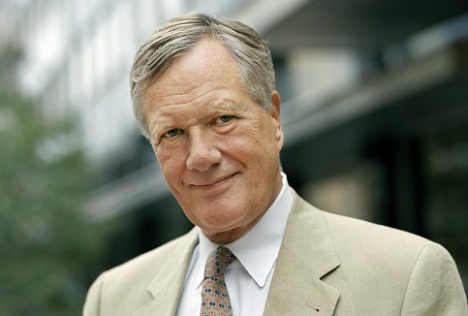But anyone meeting veteran Swedish business executive Michael Treschow, current chair of consumer-goods conglomerate Unilever, is in for a sweet surprise.

“What sort of ice cream would you like?” he asks politely, before reaching into the office’s iconic bin of GB Glace, the Swedish ice cream brand in which Unilever has had a stake since the mid-1980s.
Amid bites from his Magnum ice cream bar, the 71-year-old Swede, who claims to have spent “about 100 nights a year” living outside his home country over the last 40 years, reflects on how things have changed for Swedish companies looking to expand abroad.
“In the old days, you started here, and then perhaps Denmark and Norway, then you'd jump to Germany and the UK,” he explains.
“But with young entrepreneurs these days it’s boom, they go straight to China or Silicon Valley. They don't have to make all of those steps that companies did in the past.”
Treschow’s international career began in the early 1970s when he was sent to France to set up operations for Sweden’s Bahco Ventilation, a firm with roots tracing back to the Swedish inventor of the adjustable spanner, Johan Petter Johansson
At the time, a Swede moving to the continent wasn’t quite as common as it is today.
“Yes, it was a little unique back then. It was a little, ‘Oh, here's some stranger coming from the north’. I was regarded as something of a curiosity,” he recalls.
Of course, Treschow adds, Swedish companies have always had an eye toward markets abroad, which is part of the reason the country boast so many successful global brands.
“We’ve been pushed out because our home market has always been too small,” he explains.
“So when an idea comes, whether it's cheap clothing or furniture for every home, or ball bearings, you always want to expand and develop, and that's how that journey to overseas markets always starts.”
“Swedes can be socially lazy”
But when asked whether there is something that “makes a company Swedish”, Treschow pauses.
“Perhaps there’s an emphasis on quality, and some of those Lutheran values of doing good and working hard, and not cheating,” he says.
“But I guess to figure out what is Swedish you have to figure out what we Swedes appreciate: clean air, clean water, a healthy environment, not living all packed together.”
Another big change has been the explosion of communication channels that allow far-flung colleagues and clients stay in touch across long distances without leaving their desks.
“There’s a lot more interaction today,” he says. “All the new connections that are possible through mobile phones, Skype or whatever, is fascinating.”
But, Treschow adds, that doesn’t mean face-to-face meetings are any less important forging relationships that help businesses grow.
“You still need to have physical meetings, that is important,” he explains. “If it's a big deal you’ll need to have the closeness of a personal relationship.”
And while Swedish companies have proven themselves adept at going global, Swedes themselves can sometimes exhibit more provincial behaviour, according to Treschow.
“We are much more reserved and sometimes, I would say, some label us as being socially lazy, and there's something to that,” he explains.
“Maybe it's shyness or that we come from a peasant and country lifestyle where we were very isolated. It's as if we haven't accommodated fully to being urban and being global. And I think we have to do a better job.”
The difficulties of adopting a global point of view have manifested themselves recently in a heated debate about Sweden’s immigration policy; a debate marked by strong rhetoric from the anti-immigration Sweden Democrats that leaves many, including Treschow, uneasy.
Poor at integrating
Many seem to forget, he says, that much of Sweden’s success over the years is thanks to the contributions of immigrants.
“At all the companies I worked for, if we hadn’t had immigration from Greece, Turkey, Italy, and Yugoslavia in the 1950s and 1960s, our prosperity would have looked very different,” he says.
Treschow admits, however that Sweden “is poor at integrating” immigrants.
“We need to do a lot of things to make sure we don’t have highly-educated people stuck driving taxis,” he says.
In addition to loosening up Sweden’s labour market, Treschow suggests making the process of certifying qualifications earned abroad more efficient.
“There has to be a way to certify people that doesn’t take forever,” he says.
Sweden’s private sector can also do more to improve the integration process, Treschow adds, particularly in companies’ attitudes toward hiring immigrants.
“There are too many examples of people with different sounding names approaching companies and hearing, ‘Oh, we don’t recognize this,’ which means people more or less have to change their names to be called to interviews,” he explains.
“Instead companies should be thinking, ‘Great, here we have some diversity!’”
Treschow claims to be “very excited” about diversity, describing it as an asset for any company and for Sweden.
“The more diversity you have around the table, the more likely you are to ask all the questions that need asking. If you are too harmonized or the same type of people, the risk is that there would be fewer questions asked and fewer new initiatives. That's why I think diversity is so crucial. And immigration is a dimension of that,” he explains.
“If everyone were just like me, things would be very boring.”
This article is a part of The Local's Sustainable Sweden series and was sponsored by 


 Please whitelist us to continue reading.
Please whitelist us to continue reading.